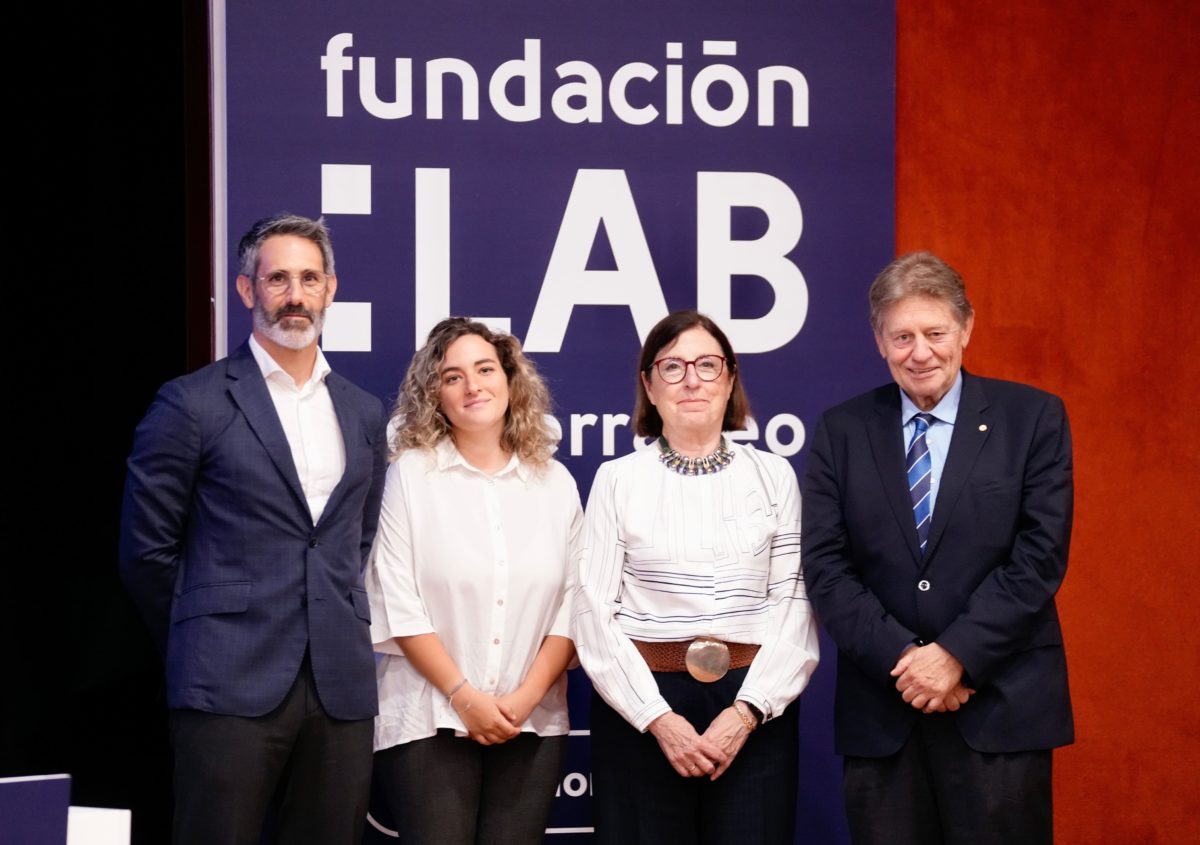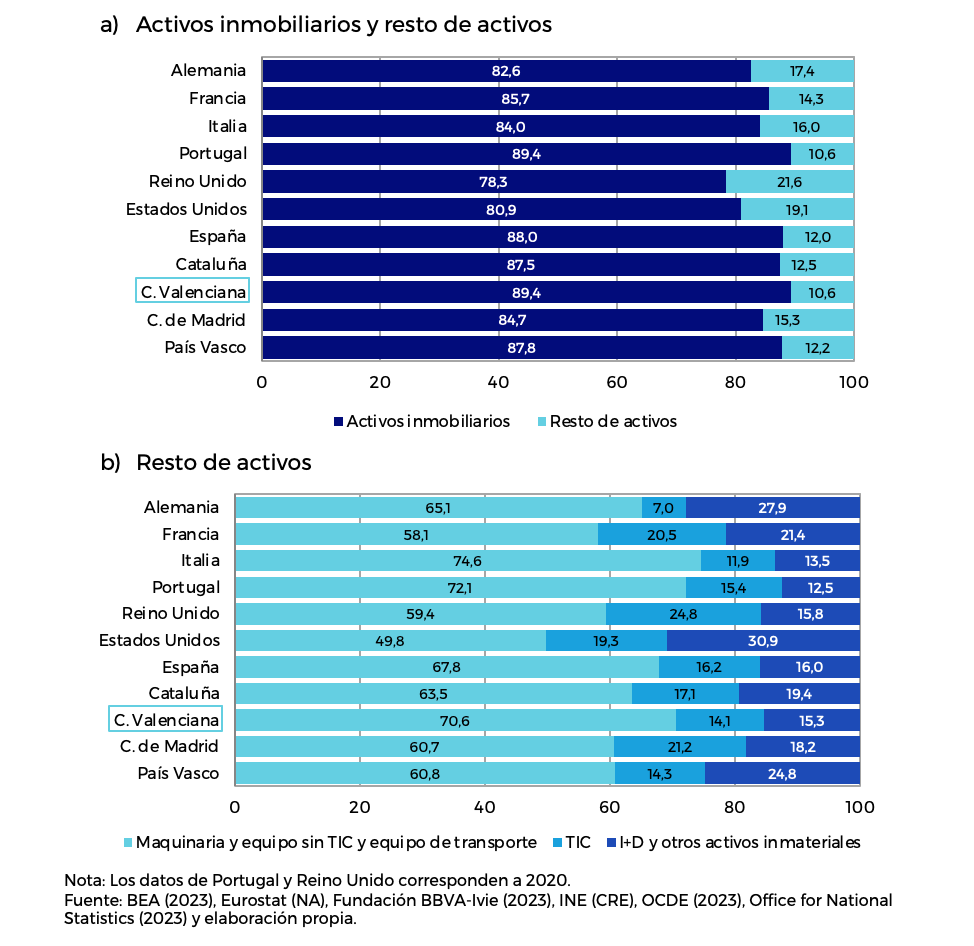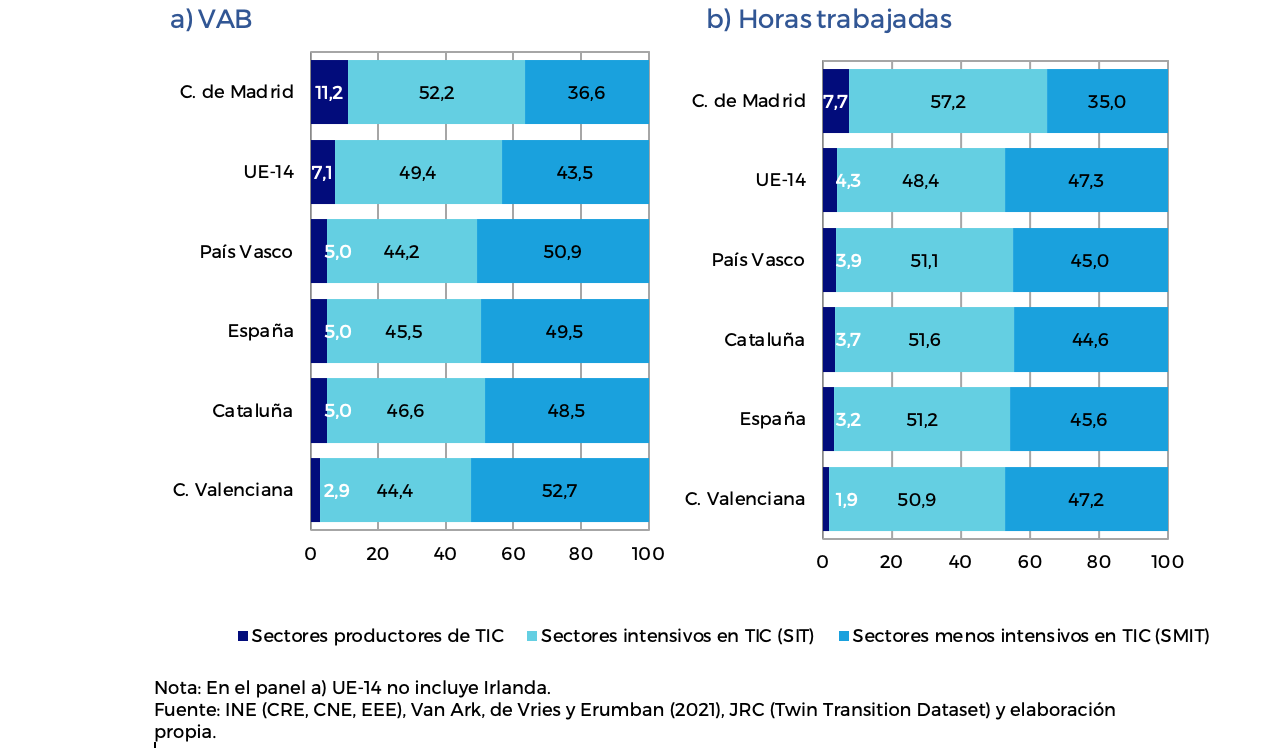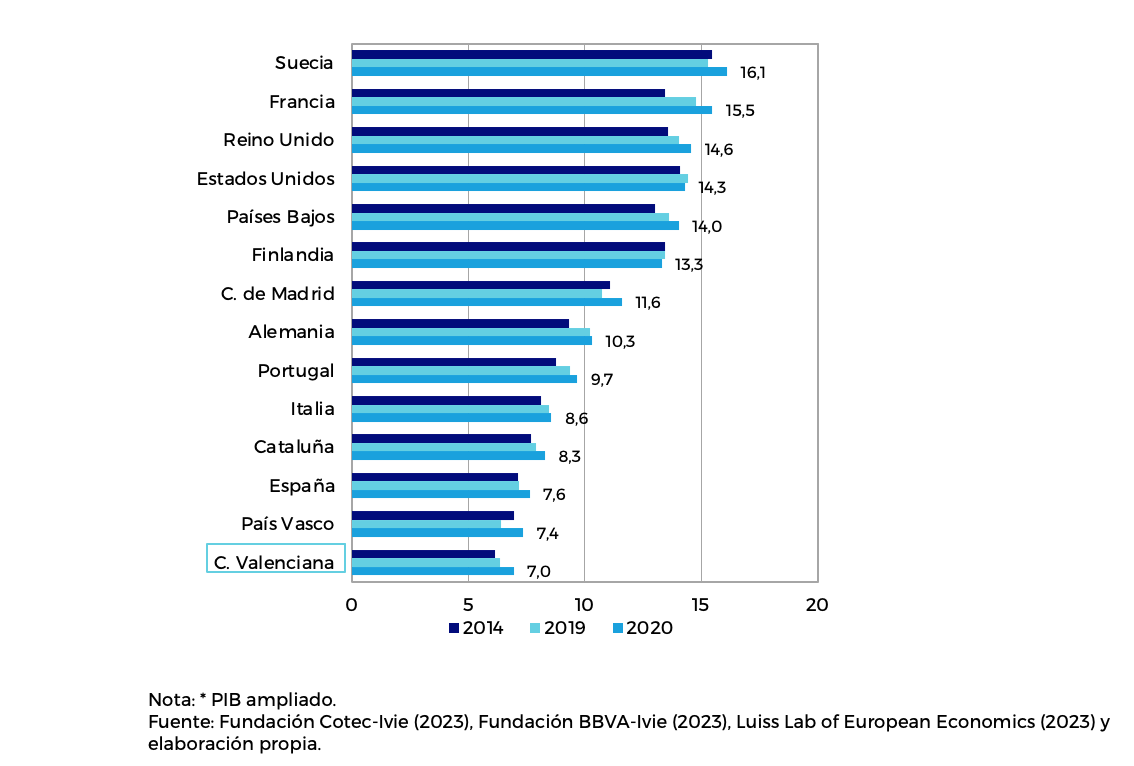The Region of Valencia, at the bottom of the list of technology-producing companies

Alicante, Juny 13th de 2023. Fundación LAB Mediterráneo, project promoted by the Valencian Business Association (AVE), today has presented the report called as: La tecnología como motor de crecimiento, included in the research program it is developing together with the Ivie and whose objective is to promote the knowledge economy in the Valencian Region. The event, chaired by Héctor Dominguis, was held today in Alicante, in the auditorium of Banco Sabadell.
After publishing two reports on R&D and Innovation, this third document analyzes the role of technology as a basis for economic and social progress and compares the situation of the Valencian Region with the most developed countries in Europe and the leading regions of Spain: the Community of Madrid, Catalonia, and the Basque Country. The document has been prepared by Ivie researchers Javier Quesada y Matilde Mas, together with Ivie economists Consuelo Mínguez y Juan Carlos Robledo.

Technology is the result of the combination of capital and labor. Therefore, the paper analyzes the fundamental aspects related to these factors that contribute to GDP growth. Firstly, it looks at investment and capital in ICT and R&D. The Valencia region stands out from the rest of the countries and autonomous regions. This is due to the high weight of real estate assets, which represent almost 90% of the capital. Of the remaining 10%, assets linked to the knowledge economy, such as ICT and R&D are less than a third, the lowest percentage of the markets studied, together with Portugal and Italy.
Capital composition. 2021 (percentage)
 The lower investment effort made by the Valencia Region (percentage of investment over GDP), especially in ICT and R&D, explains this composition of capital. The investment effort in these two assets only represents 3.5% of GDP. Although the weight of investment in real estate assets has fallen, the effects of the real estate bubble on capital are still dragging on.
The lower investment effort made by the Valencia Region (percentage of investment over GDP), especially in ICT and R&D, explains this composition of capital. The investment effort in these two assets only represents 3.5% of GDP. Although the weight of investment in real estate assets has fallen, the effects of the real estate bubble on capital are still dragging on.
The study presented today also studies the sectoral composition of the Valencian region and classifies them according to their degree of relationship with ICTs: ICT-producing sectors, ICT-intensive sectors, and less ICT-intensive sectors. The former is the most likely to favor the development of advanced technology and economic growth. However, the Valencian Community Region is the one in which these ICT-producing sectors represent the least weight. Specifically, they only contribute 2.9% of GDP and 1.9% of employment in hours worked. In contrast, the less ICT-intensive sectors account for 52.7% of GDP and 47.2% of employment. The data contrasts with those of the Community of Madrid, where technology sectors account for 11.2% of GDP and 7.7% of hours worked.
GVA and employment by ICT intensity. 2014-2020 (percentage)

This is one of the main obstacles to technological development and growth in the region, since the ICT-producing sectors are the ones that invest the most in technology and are also the most productive. However, as the authors of the document explain, in order to take full advantage of ICTs, they must be accompanied by complementary investments in intangible assets.
Both Spain and, especially, the Valencia region, lag behind in terms of investment in all types of intangible assets: software, R&D, design, brand image, human capital, and organizational structure. The investment effort in intangible assets as a whole is limited to 7% of GDP in the Valencia region, compared with 16.1% in Sweden and 15.5% in France. Among the intangibles, improvements in organization and human capital are critical determinants of productivity. The Valencia region invests the least in both and has the lowest levels of productivity.
Intangible investment effort (IA/GDP*). 2014, 2019, and 2020 (percentage)

The educational level of the population is another of the fundamental elements for getting the most out of ICTs. Once again, the data are not favorable for the region, as the percentage of people with only compulsory education is the highest of all those analyzed (42.2%), compared to the EU average of 24.9%. Furthermore, the Region has a lower weight of occupations considered to be highly qualified (32.8%), below the national average (35.6%), and far from the EU average (43.1%). This, in turn, translates into a much higher weight of over-qualification, both in Spain and in the Valencia Region. In the Autonomous Region, 37.4% of those employed with higher education have a low and medium-level job, and 35.9% in Spain, compared with 22.2% in the EU.
As well as setting out and analyzing the challenges facing the Valencian Region in the face of the necessary technological progress, the report puts forward a series of recommendations and proposals for specific improvements for companies.
Proposals for improvement for companies
-
- The Region of Valencia’s specialization in traditional, less ICT-intensive sectors does not justify its low productivity. Efficiency must be improved in all companies and sectors, imitating the leading regions..
- Promote new forms of non-bank financing to facilitate the growth of ICT-producing sectors. Moreover, these sectors are the ones that most encourage STEM studies, which favors all productive sectors.
- Integrate technological innovation as a strategic instrument of the company, dependent on general management.
- Digitalise the company not only with the acquisition of equipment but also complement it with investment in intangibles, especially those focused on the transformation of procedures (organizational innovation) and the specific training of the company’s workers and management. At present, investment in ICT is not accompanied by investment in other intangibles.
- Lead and promote this digitisation from the management, to improve knowledge of technological threats and opportunities and act accordingly.
- Adopt a medium-term horizon to obtain and evaluate the results of technological projects and prevent impatience from preventing success.
- Accept the possibility of failure in technology innovation.
- Offer placements for STEM students (university or vocational training) in internships and for doctoral students to carry out their doctoral thesis in the company.
- Create an R&D&I+ICT department as a horizontal service to the different departments of the company. Protect it and maintain the staff that accumulates satisfactory experience, even in adverse situations for the company.
LAB Mediterráneo Foundation
Fundación LAB Mediterráneo is a project created by AVE with the mission of positioning the Valencia Region as a national and European benchmark in entrepreneurship, innovation, technology, and research.
To achieve this, it has set five objectives: to promote the creation and attraction of technology start-ups; to work to attract national and international technology companies to set up in the Valencian Region and to create a ‘tractor effect’; to promote support for companies of non-technological sectors to accelerate their digital transformation; to contribute to increasing private investment in R&D&I, and to help boost research.
The Foundation’s Board of Trustees is made up of the following entities: Aceitunas Cazorla, Aquaservice/Plug and Play, AVE, Baleària, Banco Sabadell, Boluda Corporación Marítima, CaixaBank, Dacsa Group, Embutidos Martínez/KMZERO, GDES, Grupo AZA, Grupo Bertolín, Grupo Gimeno, Helados Estiu, Importaco, Lanzadera, Logifruit, Nunsys, Royo/ Invext, S2 Grupo, SPB/Cleanity TIBA/Romeu, Verne Technology Group y Zeus/Sesame.






